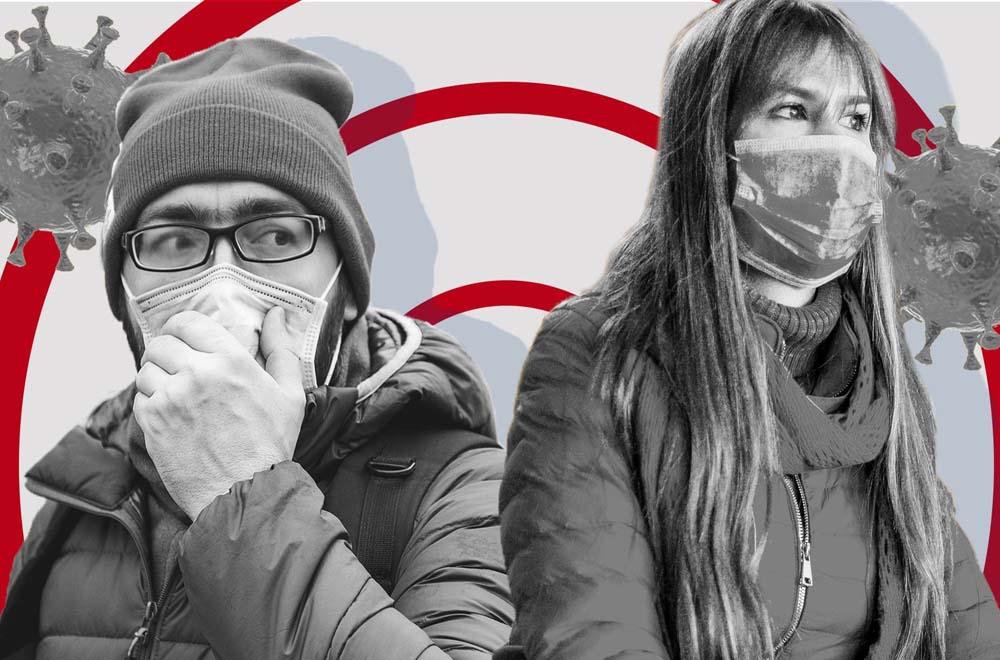Disclaimer: The Eqbal Ahmad Centre for Public Education (EACPE) encourages critical and independent thinking and believes in a free expression of one’s opinion. However, the views expressed in contributed articles are solely those of their respective authors and do not necessarily reflect the position or policy of the EACPE.
The current spread of the coronavirus (COVID-19) happens to be the most serious global health security threat that we have been witnessing. Our hearts go out to all who have been affected by the outbreak, and we are deeply grateful to the thousands of healthcare workers who are on the front lines helping their communities.
Coronavirus is a new type of virus. Fever, cough, shortness of breath are its common symptoms, and it primarily affects the respiratory tract. In rare cases, COVID-19 can lead to severe respiratory problems, kidney failure and even death. Many countries are imposing much-needed restrictions and taking aggressive containment measures to slow the spread of COVID-19.
How Coronavirus Spreads
The virus is thought to spread mainly from person-to-person.
-
Between people who are in close contact with one another (within about 6 feet).
-
Through respiratory droplets produced when an infected person coughs or sneezes. These droplets can land in the mouths or noses of people who are nearby or possibly be inhaled into the lungs.
-
Also, virus stays on surfaces and affects those who touch them.
Major Symptoms
-
Fever
-
Cough
-
Shortness of breath
-
Bluish lips or face
-
Persistent pain or pressure in the chest
-
New confusion or inability to arouse
Seek Medical Advice if You
Develop symptoms
AND
Have been in close contact with a person known to have coronavirus
OR
live in or have recently traveled from an area with ongoing spread of coronavirus.
Prevention
Helping Yourself:
-
There is no vaccine or treatment available at this time. The best way to prevent illness is to avoid being exposed to this virus.
-
Wash your hands often with soap and water for at least 20 seconds especially after you have been in a public place, or after blowing your nose, coughing, or sneezing.
-
If soap and water are not readily available, use a hand sanitizer that contains at least 60% alcohol. Cover all surfaces of your hands and rub them together until they feel dry.
-
Avoid touching your eyes, nose, and mouth with unwashed hands.
-
Stay home. Limit movement in the community. Limit visitors.
-
Clean and disinfect frequently touched surfaces. This includes tables, doorknobs, light switches, countertops, handles, desks, phones, keyboards, toilets, faucets, and sinks.
-
Stay up to date on latest information. Pakistan Government Helpline: 1166.
-
Wear mask. If you are sick, keep the blue side of mask inward. If you are healthy, keep blue side of mask outward.
-
You can disinfect your house by applying bleach. If surfaces are dirty, clean them: Use detergent or soap and water prior to disinfection.
-
Thoroughly cook all food items, such as eggs and meat etc. Avoid eating under-cooked, lightly-cooked or uncooked items.
Helping Others:
-
If you’re sick, stay at home.
-
Wash your hands often with soap and water for at least 20 seconds especially after you have been in a public place, or after blowing your nose, coughing, or sneezing.
-
If soap and water are not readily available, use a hand sanitizer that contains at least 60% alcohol. Cover all surfaces of your hands and rub them together until they feel dry.
-
Avoid touching your eyes, nose, and mouth with unwashed hands.
-
If you are sick, wear a face mask when you are around other people (e.g., sharing a room or vehicle) and before you enter a healthcare provider’s office.
-
If you are not able to wear a face mask (for example, because it causes trouble breathing), then you should do your best to cover your coughs and sneezes.
-
If you are caring for infected persons, wear a face mask if they enter your room.
Create a Household Plan:
-
Consider 2-week supply of prescription and over the counter medications, food and other essentials. Know how to get food delivered if possible.
-
Establish ways to communicate with others (e.g., family, friends, co-workers).
-
Establish plans to telework, what to do about childcare needs, how to adapt to cancellation of events.
Treatment:
-
As of now, there is not a specific treatment for the virus.
-
People who become sick from COVID-19 should be treated with supportive measures: those that relieve symptoms.
-
For severe cases, there may be additional options for treatment, including research drugs and therapeutics.
Common Myths & Reality
Myth: There are medicines available that can treat coronavirus.
Reality: There are no medicines available that can treat coronavirus. However, there are medicines that infected people may need to help relieve and treat symptoms. Some medicines can help people feel better or recover faster. It is important to take the medicines that a qualified doctor prescribes to help deal with the infection.
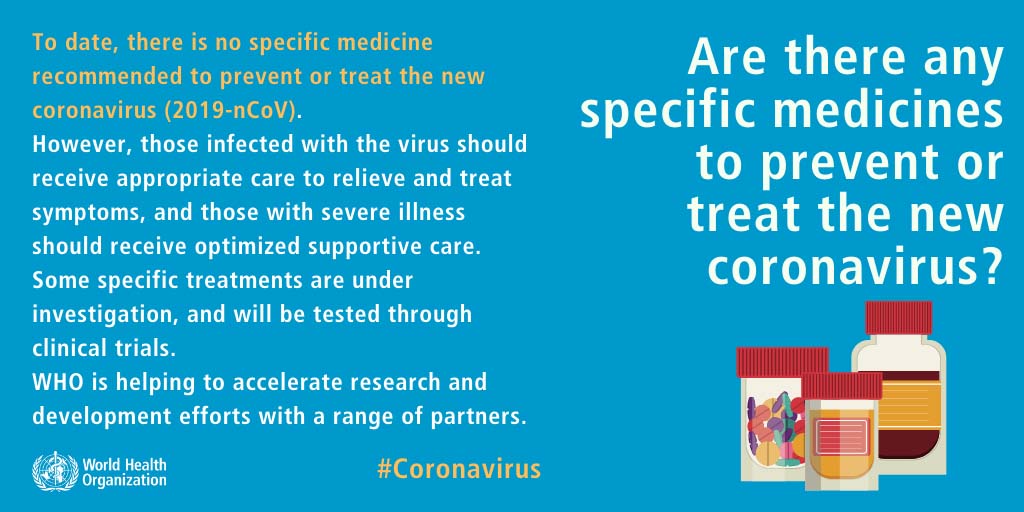
Myth: Antibiotics can treat coronavirus.
Reality: Antibiotics cannot treat coronavirus. Coronavirus is a virus. Antibiotics are only effective against bacteria – not viruses. However, if a person is infected, one may receive antibiotics because bacterial co-infection is possible and it is important to prevent or treat co-infections.
Myth: Taking a hot bath helps protect against coronavirus.
Reality: Taking a hot bath does not protect the new coronavirus disease. Actually, taking a hot bath with extremely hot water can be harmful, as it can burn you. The best way to protect yourself against COVID-19 is by frequently cleaning your hands. By doing this you eliminate viruses that can be on your hands and avoid infection that could occur by then touching your eyes, mouth, and nose
Myth: Coronavirus only spreads in hot and humid climates.
Reality: Coronavirus can spread in all areas, including areas with hot or humid climate.
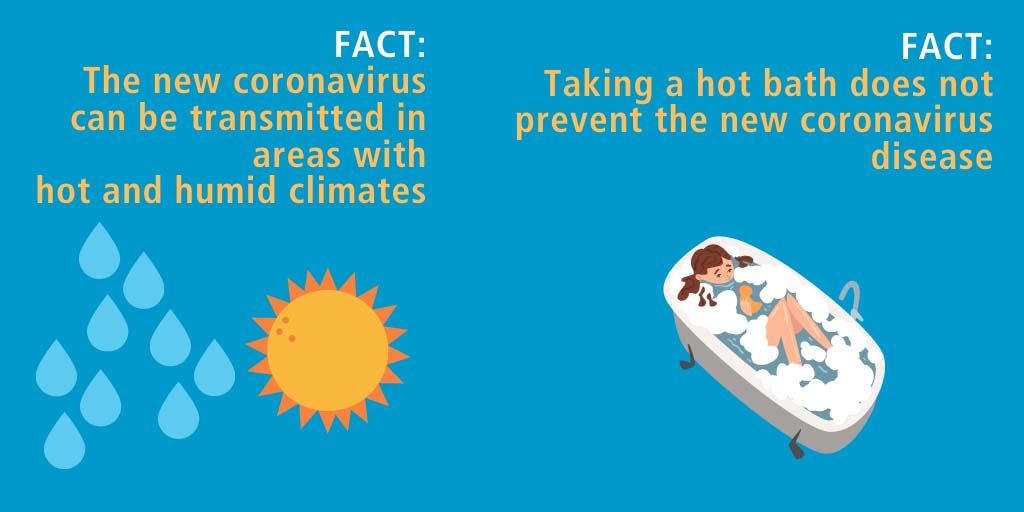
Myth: Coronavirus is an issue affecting only Karachi or other parts of Sindh.
Reality: Coronavirus is not an issue affecting only Karachi or other parts of Sindh. Coronavirus cases have been confirmed in all parts of Pakistan, including Punjab, Khyber-Pakhtunkhwa, Balochistan, as well as Gilgit Baltistan and Azad Kashmir. People in all areas need to take necessary precautions.
Myth: Coronavirus is necessarily fatal and all affected die.
Reality: Coronavirus is not necessarily fatal. It is a very serious disease and may need extensive medical care, including hospitalization. However, it does not always result in fatality especially if necessary medical care is provided. The effects are more severe on older people or people with pre-existing conditions. While it is difficult to say exactly at this time, between three and four percent of affected persons may ultimately die. Of these, about 80% may be expected to be persons 60 years and older.
Myth: Coronavirus is a Chinese disease/Coronavirus affects only Chinese or European people.
Reality: Coronavirus is not a disease linked with any race or ethnicity and can affect people of any race and ethnicity.
Myth: Gargling with bleach can help protect against coronavirus.
Reality: Bleach can be harmful to you. It is not recommended to gargle with bleach at all.
Myth: Pneumonia vaccines, such as pneumococcal vaccine and Haemophilus influenza type B (Hib), are effective in protecting against coronavirus.
Reality: No. Vaccines against pneumonia, such as pneumococcal vaccine and Haemophilus influenza type B (Hib) vaccine, do not provide protection against the new coronavirus. Coronavirus needs its own vaccine. At this time, there is no vaccine available for coronavirus.
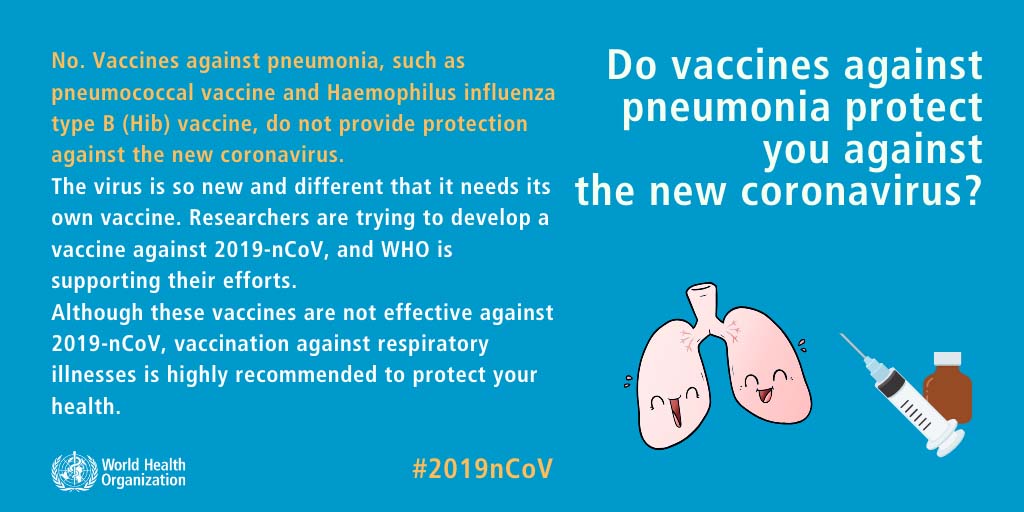
Myth: China and America are developing vaccines which will be available soon.
Reality: While it is true that scientists are working on vaccines in China, America, Germany and several other countries, but even the vaccines in their most advanced stages of development are just in their clinical trial phase. After testing, a vaccine needs to be mass produced and shipped to different parts of the globe. Once in a location, millions of residents need to be inoculated. This process will take time. It is difficult to say how quickly this process may be completed. However, 18 months or so, is a more realistic time frame for this to happen.
Myth: Eating garlic helps protect against coronavirus.
Reality: Garlic is a healthy food that has anti-microbial properties, but there is no evidence that eating garlic has protected people from the new coronavirus.
Myth: Regularly rinsing nose with saline water helps protect against coronavirus.
Reality: No. There is no evidence that regularly rinsing the nose with saline has protected people from infection with the new coronavirus. There is some limited evidence that regularly rinsing nose with saline can help people recover more quickly from the common cold. However, regularly rinsing the nose has not been shown to prevent respiratory infections.
Myth: Coronavirus affects only old people.
Reality: People of all ages can be affected by coronavirus. Older people have greater difficulty in recovering from the disease. This may be because of frailty, less immunity or a pre-existing condition. However, this does not mean that young people cannot get affected by coronavirus.
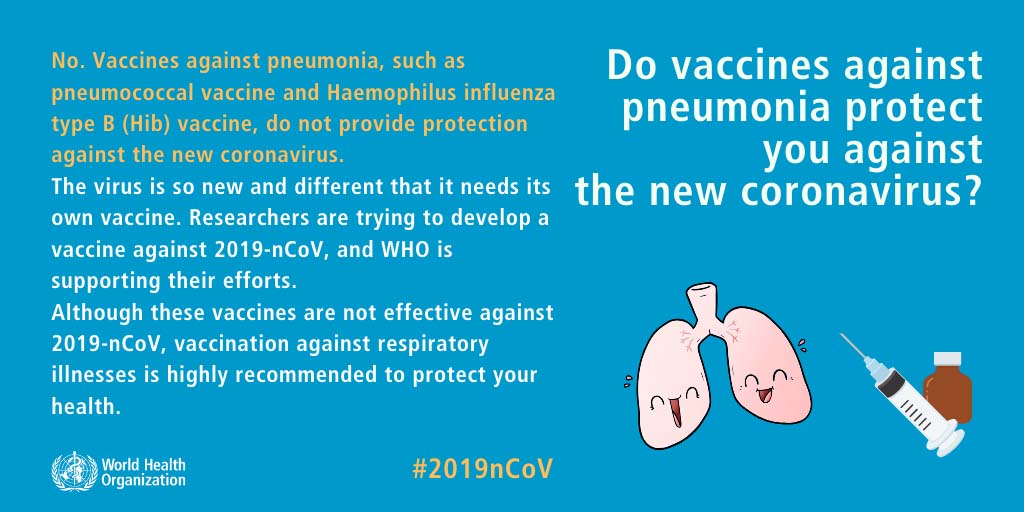
Myth: Taking steroids or ascetic acid will help protect against coronavirus.
Reality: There is no evidence to suggest that taking steroids or ascetic acid will help protect against coronavirus.
Myth: The new coronavirus was deliberately created or spread by humans.
Reality: Viruses can change over time. Occasionally, a disease outbreak happens when a virus that is common in an animal such as a pig, bat or bird undergoes changes and passes to humans. This is likely how the new coronavirus came to be.
Myth: A face mask is a necessity and guarantees protection against coronavirus.
Reality: Tight-fitting masks (such as the N95) can protect healthcare workers as they care for infected patients. For the general public without respiratory illness, wearing lightweight disposable surgical masks is not recommended. Because they don’t fit tightly, they may allow tiny infected droplets to get into the nose, mouth or eyes. Also, people with the virus on their hands who touch their face under a mask might become infected. People with a respiratory illness can wear these masks to lessen their chance of infecting others. Bear in mind that stocking up on masks makes fewer available for sick patients and health care workers who need them.
References
Note
If you’re looking for fact-based information about COVID-19 and how does it spread, it’s recommended that you enroll a free online course Science Matters: Let’s Talk About COVID-19 by Imperial College of London, one of the top public health research universities in the world on Coursera.
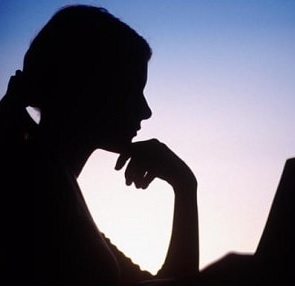 Asma Tariq is a university student hailing from Gujrat, Pakistan. She writes on social and developmental issues, and works for Sundas Foundation Gujrat for raising awareness about Thalassaemia and Haemophilia.
Asma Tariq is a university student hailing from Gujrat, Pakistan. She writes on social and developmental issues, and works for Sundas Foundation Gujrat for raising awareness about Thalassaemia and Haemophilia.


